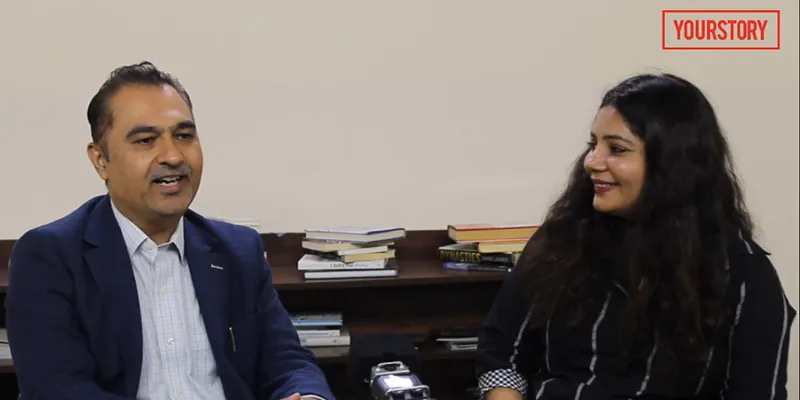WATCH: Avnish Sabharwal on Accenture Ventures’ focus on disruptive B2B startups and ‘applied intelligence’
Accenture Ventures is interested in disruptive B2B startups, particularly in the field of applied intelligence, through the latest edition of its Open Innovation programme. In a conversation with YourStory Founder and CEO Shradha Sharma, Avnish Sabharwal, MD, Accenture Ventures India, tells us more.
The rise of B2B startups can no longer be ignored. The number of Indian B2B startups in India tripled from 900 to 3,200 between 2014 and 2018, according to a study by NetApp and Zinnov. B2B startups now make up nearly half of all tech startups in the country, while funding for them has similarly surged.
These recent developments have also been aided by a growing number of B2B-focused VC funds that concentrate on investing in “deep-tech” startups, as well as programmes specifically tailored to nurture B2B startups.
1560258671037.png?fm=png&auto=format)
Avnish Sabharwal, Managing Director of Accenture Ventures in India
To this end, global consulting company Accenture has created Accenture Ventures, its venture capital arm, to work with these disruptors in the field, and pair them with clients to help them deliver their solutions on a large scale.
Accenture Ventures also partnered with YourStory to launch Open Innovation, a yearly programme to recognise disruptive B2B startups that are solving the industry’s biggest problems. The theme for 2018 was Industry X.O, while this year’s theme is Applied Intelligence.
YourStory’s Shradha Sharma sits down with Avnish Sabharwal, Managing Director of Accenture Ventures in India, to find out what exactly applied intelligence is, the startup scene in India, and what makes an “epic disruption”.
How can Accenture Ventures help B2B startups?
Avnish says he is very happy to see the B2B boom that has swept the nation, in particular, the rise of deep-tech startups. He notes that this is also reflected in the average age of entrepreneurs working in the B2B, which produces more mature and experienced people. These startups also have a “more meaningful matrix” than just GMV or market value.
There are three stakeholders throughout the programme - the client, Accenture, and the startup. The programme is designed to help startups grow and scale, and Avnish notes that they view startups who work in this programme as an extended part of an enterprise.
“They are our strategic partners, which means that this is not a big corporate working with a small vendor. This is not that kind of a relationship,” Avnish adds.
With their clients, he says Accenture’s first aim is to position them for success. Compared to complex MNCs, startups can look downright “fragile” by comparison. The company works with all stakeholders to make sure that there are no hiccups. And, finally, Accenture works with their startups to help them globalise.
Avnish says he can recall at least 20-25 startups who, after partnering with Accenture, now have multiple engagements with the company and its global clients.
“From a client's perspective, they get the best of both - what Accenture has to offer and what the ecosystem has to offer as well,” he says.
The benefit for Accenture comes in when they can integrate these solutions into their overall portfolio, giving the company a significant edge over their competitors. “So, it's a win-win situation for all the three entities and it has been about four years since we are running it,” he says.

Avnish Sabharwal speaks to Shradha Sharma
One thing that is key for Accenture is that the startup has to be in growth-stage. With the kind of clients that the company has, they require a company that has an established product-market fit, a steady revenue stream, and a firm client base.
“We are not the entity which can take you from 0 to 1, but from 1 to 10, we are the people and very fast,” he said.
What is applied intelligence?
Applied intelligence, Avnish notes, is an offshoot of artificial intelligence (AI), which Indian companies have been increasingly investing in. AI has the potential to add $957 billion to India’s economy by 2035, according to an Accenture report. And the company defines applied intelligence as combining AI, analytics, and data with responsibility.
“And we feel that all these factors, when they come together, produce something we call ‘applied intelligence’, and that has the power to change industries and businesses in the future,” Avnish says.
According to Accenture, while AI will transform only a part of a customer’s business, applied intelligence has the power to change its very nature. Applied intelligence will allow companies to transform their business across every function and process.

The challenge
According to Avnish, there are three things he looks for whilst appraising a startup. The first, and most important, is the “magnitude of disruption” that a company can bring to the table, or those products that can be ‘the next big thing’ in an industry.
“We feel that we are living in the era of what we call 'epic disruption' and Accenture is doing a lot of work in this space,” he says.
The second point involves size. Accenture and its clients operate on a scale that a startup may not be able to immediately get used to, therefore the company’s ability to scale becomes very important.
“The third point is that there has to be some sort of a delivery DNA in the startup because these are great innovators but not necessarily the best organisations that can do a great job as far as delivery is concerned,” Avnish adds.
Accenture Ventures has closed invitations for this year’s entry. The participants will compete in five segments - analytics, automation, AI, data, and industrial AI. Later this week, Accenture will complete its preliminary shortlisting and, in late July, the winner will be announced.
The winners will be invited to join a special cohort programme and will have the opportunity to work at the Accenture Innovation Hub. They will also receive access to Accenture’s clients across the globe, as well as industry forums such as National Association of Software and Services Companies (Nasscom) and Federation of Indian Chambers of Commerce and Industry (Ficci).
Last year, IIT-Madras incubated startup Detect Technologies placed first for its intelligent asset-monitoring solution. Ecolibrium Energy and SatsSure came in second and third place, respectively.
“I'm not saying that these companies were not in the limelight before the challenge but immediately after the challenge, you could see a complete change in terms of their visibility- not only with Accenture but outside, as well,” he says.


1560258671037.png?mode=crop&crop=faces&ar=2%3A1&format=auto&w=1920&q=75)
1560143014883.jpg?fm=png&auto=format&h=100&w=100&crop=entropy&fit=crop)

1559150839656.png?fm=png&auto=format&h=100&w=100&crop=entropy&fit=crop)




